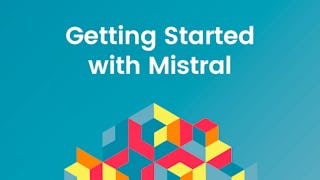- Browse
- Api
Results for "api"
 Status: NewNewStatus: PreviewPreviewC
Status: NewNewStatus: PreviewPreviewCCoursera
Skills you'll gain: API Testing, Test Script Development, Scenario Testing, Software Testing, Integration Testing, Test Case, Test Automation, Test Tools, Regression Testing, Maintainability, User Interface (UI), Security Testing, Test Data, Scalability, Debugging, Authentications, Compliance Reporting, Performance Tuning, Automation
Intermediate · Course · 1 - 4 Weeks
 Status: NewNew
Status: NewNewSkills you'll gain: Jenkins, CI/CD, Continuous Integration, Test Automation, Continuous Delivery, API Testing, Software Development, Application Deployment, DevOps, Unit Testing, Agile Methodology, Software Development Methodologies, Performance Testing, GitHub
Intermediate · Course · 3 - 6 Months
 Status: PreviewPreviewB
Status: PreviewPreviewBBoard Infinity
Skills you'll gain: DeepSeek API, Deepseek, Retrieval-Augmented Generation, Model Deployment, AI Enablement, Make.com, Generative Model Architectures, LLM Application, Cloud Deployment, Embeddings, Software Documentation, Unit Testing, Key Management
Beginner · Course · 1 - 3 Months
 Status: Free TrialFree TrialS
Status: Free TrialFree TrialSScrimba
Skills you'll gain: React.js, Performance Tuning, Frontend Performance, Front-End Web Development, Application Performance Management
Advanced · Course · 1 - 4 Weeks

Skills you'll gain: ChatGPT, Computer Programming Tools, Software Development Tools, Microsoft Copilot, Integrated Development Environments, Web Development Tools, Code Review, Application Programming Interface (API), React.js, Unit Testing, Jest (JavaScript Testing Framework), Node.JS, Debugging, Middleware
Intermediate · Course · 1 - 3 Months
 Status: FreeFreeD
Status: FreeFreeDDeepLearning.AI
Skills you'll gain: Prompt Engineering, Retrieval-Augmented Generation, Tool Calling, LLM Application, JSON, Large Language Modeling, Model Deployment, Artificial Intelligence
4.6·Rating, 4.6 out of 5 stars16 reviewsBeginner · Project · Less Than 2 Hours

Skills you'll gain: TCP/IP, Network Protocols, Application Programming Interface (API), Ajax, Web Development, General Networking, Web Applications, Javascript, Scalability, Event-Driven Programming, Server Side, Real Time Data, Network Analysis
Intermediate · Course · 1 - 3 Months
 Status: PreviewPreviewK
Status: PreviewPreviewKKodeKloud
Skills you'll gain: Prompt Engineering, OpenAI, OpenAI API, Responsible AI, Multimodal Prompts, AI Enablement, ChatGPT, Data Ethics, Artificial Intelligence, Generative AI, Tool Calling, AI Workflows, LLM Application, Image Analysis, Large Language Modeling, Natural Language Processing, Vision Transformer (ViT), Embeddings, Computer Vision, Reinforcement Learning
Beginner · Course · 1 - 3 Months

Skills you'll gain: Back-End Web Development, Full-Stack Web Development, Node.JS, Server Side, Restful API, JavaScript Frameworks, Web Development, Web Applications, Web Servers, Javascript
Intermediate · Guided Project · Less Than 2 Hours

Skills you'll gain: Open Web Application Security Project (OWASP), Threat Modeling, Application Security, Software Development Life Cycle, DevSecOps, Security Testing, Secure Coding, Security Engineering, Cloud Security, Encryption, Vulnerability Scanning, Software Development, CI/CD, Cloud Platforms, Vulnerability Assessments, Vulnerability Management, Penetration Testing, Cybersecurity, Configuration Management
Intermediate · Course · 3 - 6 Months

Skills you'll gain: Web Development, JavaScript Frameworks, Web Applications, React.js, Serverless Computing, Restful API, Application Programming Interface (API), Server Side
Intermediate · Guided Project · Less Than 2 Hours
 Status: Free TrialFree TrialG
Status: Free TrialFree TrialGGoogle Cloud
Skills you'll gain: Model Deployment, Tensorflow, Keras (Neural Network Library), Google Cloud Platform, Deep Learning, Data Manipulation, Machine Learning Methods, Data Preprocessing, Data Pipelines, Artificial Neural Networks
4.6·Rating, 4.6 out of 5 stars23 reviewsIntermediate · Course · 1 - 3 Months
In summary, here are 10 of our most popular api courses
- Advanced Cypress Testing: Coursera
- CI/CD for Test Automation: Jenkins & GitHub Actions: Packt
- Mastering DeepSeek: From Architecture to Application: Board Infinity
- What's new in React 19?: Scrimba
- Introduction to AI Tools for Coders and Programmers: Packt
- Getting Started with Mistral: DeepLearning.AI
- WebSockets Protocol Explained – Master Web Development: Packt
- Introduction to OpenAI: KodeKloud
- Build an Online Auction Server with ExpressJS: Coursera
- Fundamentals of Secure Software: Packt










